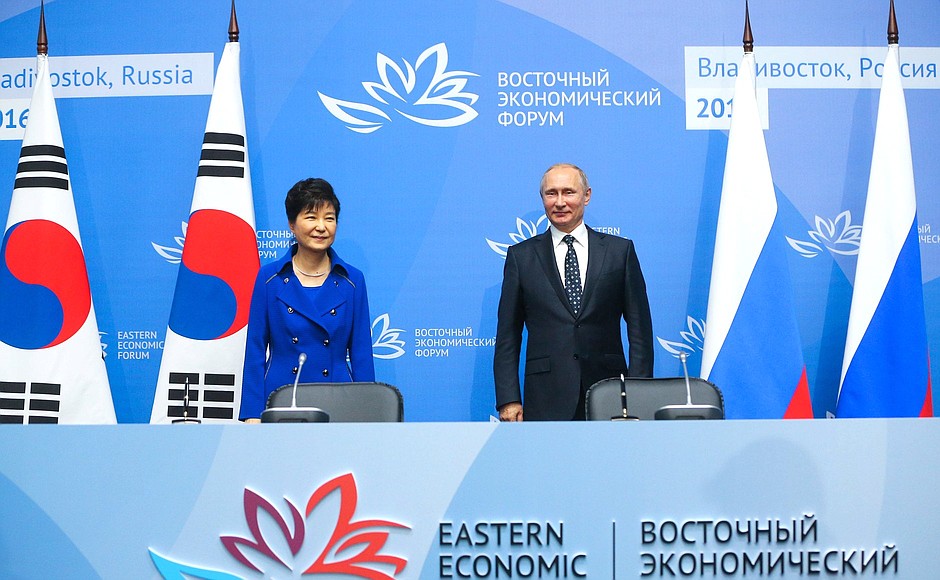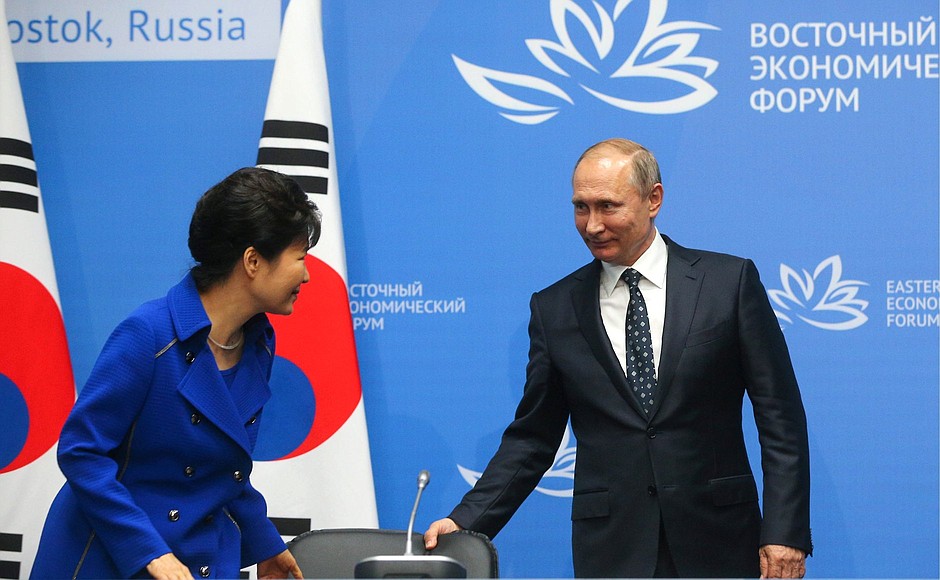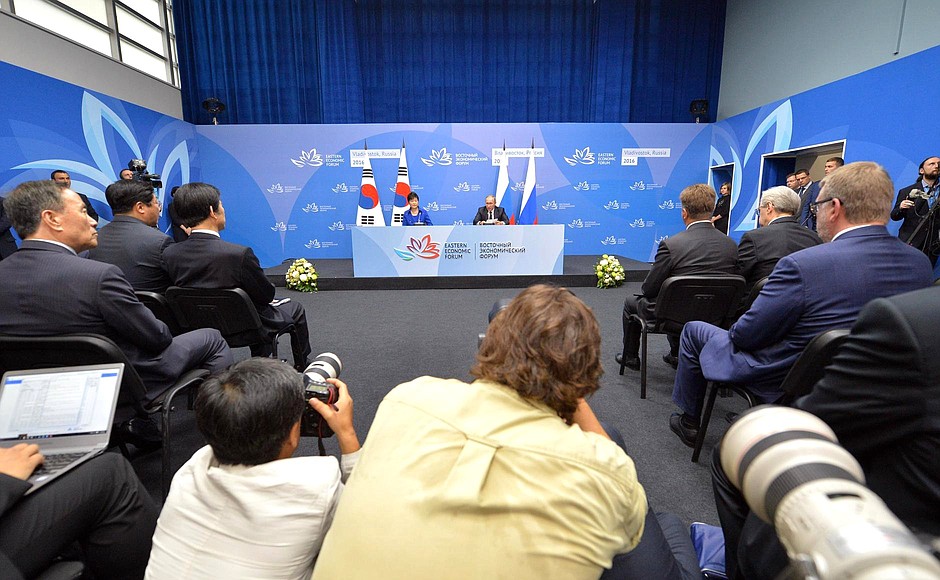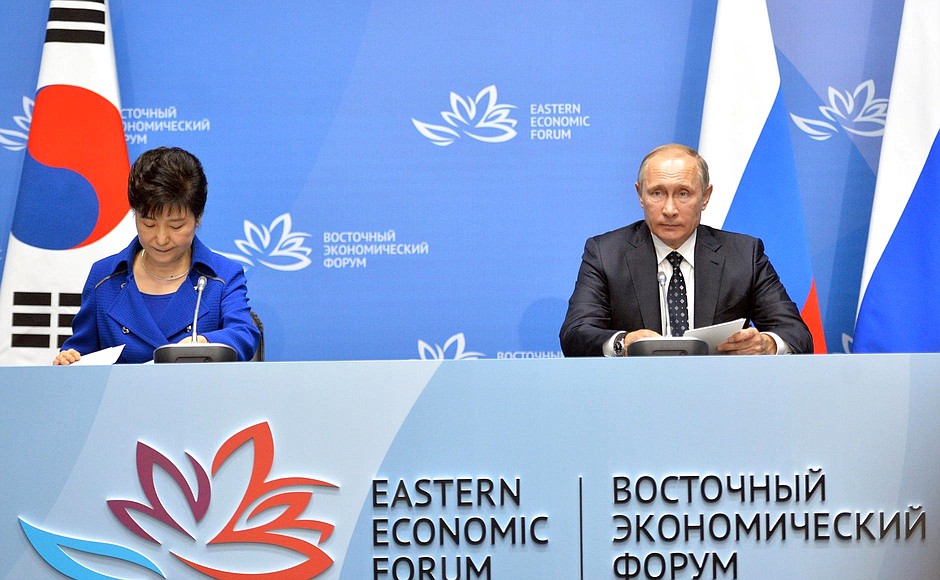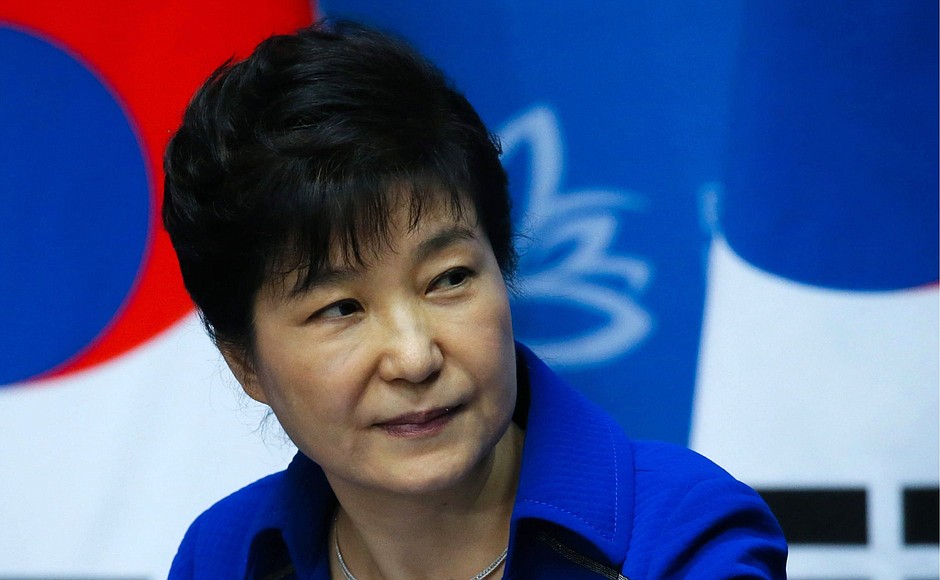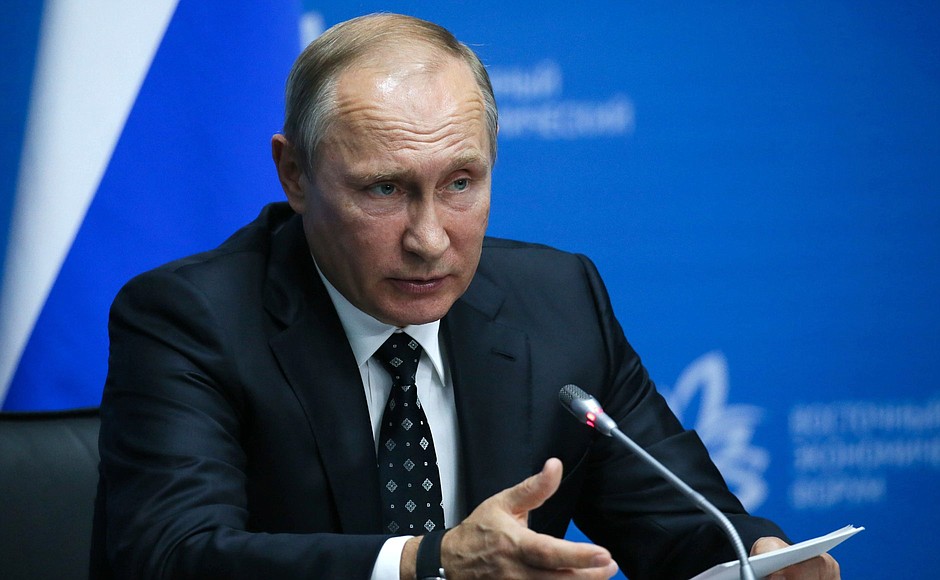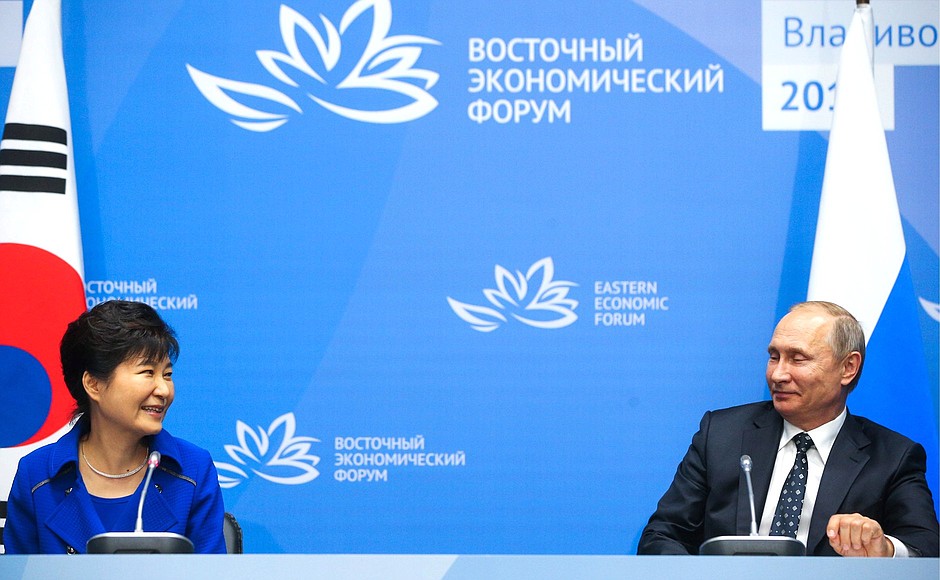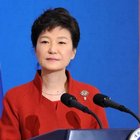President of Russia Vladimir Putin: Colleagues, friends,
First, let me express my gratitude to Ms Park Geun-hye and Prime Minister of Japan Shinzo Abe, who has already left. I would like to thank them both for accepting our invitation and taking part in the Eastern Economic Forum as guests of honour.
As you know, this morning, the three of us together opened one of the world’s largest oceanariums on Russky Island. I mentioned at the plenary session that this is not just an oceanarium but also a science and education centre.
We shared our views regarding some pressing issues and prospects for developing regional economic integration in the Asia-Pacific Region. During our talks, we spoke of the efforts to more actively attract foreign businesses and our foreign colleagues to take part in Russia’s programmes for the comprehensive development of the Russian Far East.
See also
I would like to note a growing interest in the forum from the business community, the public and political circles of the Asia-Pacific Region. This year, Vladivostok is welcoming some 3,000 guests – businesspeople and investors from 35 countries.
President Park and I held bilateral talks that took place in a businesslike and constructive spirit. We had a detailed discussion of the key aspects of our wide-ranging bilateral cooperation. I note that the Republic of Korea is an important and promising partner for Russia in the Asia-Pacific region.
Our countries conduct an intensive political dialogue. This is my third meeting with President Park over the past year. We also have contacts between our parliaments, foreign ministries and other ministries and agencies, and we have an intergovernmental commission.
Our bilateral economic ties have been traditionally close. Regrettably, global economic difficulties led to a drop in our bilateral trade last year. We discussed today what we need to do to get our trade turnover back on a steady growth track. This is in both countries’ interest.
We have good experience in investment cooperation. Korean companies have invested more than $2.3 billion in the Russian economy. Some 600 Korean companies are working with success on the Russian market. Incidentally, the Korean delegation is one of the biggest here at the Eastern Economic Forum.
Our tasks today include improving our partnership’s financial infrastructure. We think it important to step up work on joint investment platforms, the initiative that we took together and approved three years ago.
We discussed prospects for energy sector cooperation. This concerns hydrocarbons, electricity, and nuclear energy. Last year, 1.5 million tons of liquefied natural gas was delivered from Sakhalin-2 to Korea. In the nuclear energy sector, Russia covers around 20 percent of Korean nuclear power stations’ demand for enriched uranium. We are looking at possibilities for Russian power supplies to Korea.
We are also developing our industrial cooperation. Hyundai Motors is working with success on the Russian market. Last year, the millionth car left the assembly line at the company’s plant in St Petersburg. Samsung produces electronics goods and home electronics in Russia. Korean subcontractors are also carrying out big orders for our transport companies, including Sovkomflot, for 6 gas tankers of the icebreaker class.
Rosneft, together with Korean companies, plans to modernise facilities at the Zvezda shipyard. The National Chemicals Group plans to build a new plant in Nakhodka to produce mineral fertiliser. Our Korean partners have confirmed their interest in establishing a free trade zone with the Eurasian Economic Union. We are also prepared to look at how we can link our integration plans and the ideas President Park envisions as part of her Eurasian initiative.
Of course, we hope that our partners will take part in the priority development areas in the Far East and in the Vladivostok and other free ports that we have established in the region.
Humanitarian exchanges are a very important aspect of our relations. The visa-free regime introduced in 2014 has greatly contributed to this. We support our partners’ proposal to hold the Week of Korean Culture in Russia in 2017.
During our talks, we also had a substantial discussion on current international issues of course, including the situation on the Korean Peninsula. I would like to stress that our countries will not accept Pyongyang’s self-proclaimed nuclear status. Russia takes the view that a solution to the nuclear issue on the Korean peninsula must be found as part of general military and political détente in Northeast Asia.
We need to reduce the level of military confrontation and lay the base for mutual trust between the region’s countries. Of course, we also need to avoid any provocations and escalation of tension. Let me say again that only by uniting our efforts can we create favourable conditions for bringing the region’s countries closer together in the aim of guaranteeing stability, security and prosperity.
In conclusion, once more I would like to thank Ms Park Geun-hye and all of our Korean colleagues for these frank and substantive talks. I am sure that they will help us to further develop our cooperation in all areas.
Thank you for your attention.
President of the Republic of Korea Park Geun-hye (retranslated): President Putin and I are pleased to note that we have had a landmark meeting today in the heart of the Russian Far East, in Vladivostok, which is bound to pave the way for the development of Korean-Russian relations. As a guest of honour, I had the opportunity to attend and address the Eastern Economic Forum, a platform for Russia's new Eastern policy pursued by President Putin as part of Russia’s national strategy.
Mr President and I have held our fourth talks so far. During the meeting, we exchanged views on the need to strengthen cooperation in the Far East, where the Eurasian initiative I am pursuing correlates with your new eastern policy, and again confirmed that Korea and Russia are important partners in dealing with the nuclear issue and other matters pertaining to North Korea.
As heads of state, we agreed to broaden practical cooperation in the Far Eastern region of Russia, paying attention to its strategic importance. I believe that if we combine the rich natural resources of the Russian Far East with Korean capital and technology, the region could become a new Blue Ocean for the prosperity of our countries.
It is important that we constantly create at least small success stories and strengthen the relationship of trust and confidence in the success that will continuously stimulate a virtuous cycle of bilateral cooperation.
Many Korean businesses are already expanding in the Far East – in agriculture, fisheries, and infrastructure. I hope that their cooperation will expand with the creation of high added value and a solid foundation for cooperation, especially in industry.
My visit to Russia is especially significant because we have signed a number of agreements and memorandums in various fields, such as healthcare, medical services, the Arctic, industry, the ocean, and cooperation in rescue operations, which have created a solid legal framework for our cooperation.
In particular, the expansion of bilateral cooperation in healthcare and medical services, including remote treatment with the use of ICT, is particularly important, as it can contribute not only to improving the wellbeing of the Far Eastern region, but also to expanding cooperation in a field with high added value. This morning we have seen keen interest from our countries’ business leaders. I hope that these efforts will yield great results.
As heads of state, we exchanged views on a wide range of issues concerning the strengthening of ties on the Eurasian continent. The Republic of Korea has completed a nine-month joint research project with the EAEU, where Russia plays a central role, on the possibility of a free trade zone agreement, which generated a basic framework for the start of the negotiation process. It is of great importance for regional integration and the development of free trade.
Further developing our bilateral mutually advantageous cooperation requires above all resolving as soon as possible the North Korean nuclear and missile issues, which create the biggest threat to security in the region. President Putin and I have agreed to further strengthen our strategic communication on resolving this and other issues.
Along with the threat of further nuclear tests, North Korea declares that it will make preventive strikes. This is a lethal threat for us because we live within mere minutes of a North Korean nuclear missile strike, and the probability of such an attack is increasing every day. The North Koreans have improved their technology and have even carried out the launch of submarine-launched ballistic missiles.
In this situation, responsible governments have to act in the name of their peoples’ security and protection. If the international community has no firm will to take urgent measures to resolve the North Korean nuclear and missile issues, this could create a threat to peace and security not only in Northeast Asia but for the global community in general.
UN Security Council Resolution 2270, which imposes the most stringent sanctions on North Korea, is being implemented in full now, and this is our last chance to influence change in North Korea’s behaviour. In this respect, it is thanks to President Putin’s leadership qualities that the Russian Government has taken a firm line regarding North Korean possession of nuclear weapons and plays a constructive role in implementing the UN Security Council resolutions aimed at deterring North Korea from further provocations.
North Korea must demonstrate its genuine commitment to renouncing nuclear weapons and become open to dialogue on demilitarisation. If this happens, we would be more than happy to offer North Korea opportunities for achieving peace and joint prosperity.
I hope that we will become reliable and close partners working together for peace and prosperity on the Korean Peninsula, in Northeast Asia, the Far East, and the Eurasian region and on the international stage. With this goal in mind, I would like to continue our ongoing dialogue and exchange and take our cooperation to a qualitatively new level.
I express my respect to President Putin for the successful organisation of this Eastern Economic Forum. I am certain that today’s meeting will pave the way for further developing Korean-Russian relations on a mutually advantageous basis.
Thank you.
